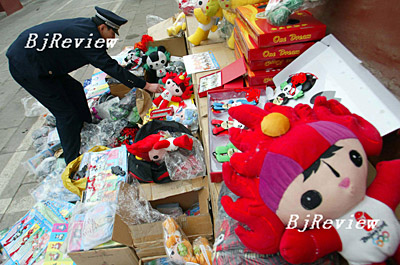
"I totally did not realize that I had made a mistake---I just want to express our best wishes toward the Olympic Games," said the boss of a small factory after being warned for violating intellectual property rights law for printing "Our factory wishes a successful Olympic Games in Beijing" and the five-ring Olympic symbol on company packages.
According to the media there have been many similar "accidents." The enormous profits that the Games attract are a magnet for businessmen wanting to cash in. Unavoidably, some unauthorized enterprises or individuals violate the law and infringe on the interests of authorized enterprises.
According to the regulations of International Olympic Committee (IOC), only sponsors, cooperative partners and suppliers for the Olympic Games can use Olympic symbols. There are altogether 52 enterprises participating at four different levels of sponsorship all over the world.
Some unauthorized enterprises try to find ways to escape punishment when they are caught breaking the rules, but "no matter how crafty those tricks are, they cannot totally avoid intellectual property laws," said Li Yanjun, Division Chief of BOCOG's Legal Affairs.
The funds of the Olympic Games come mainly from the sale of Olympic products, sponsors and other business development programs. After successfully bidding for the Olympic Games on July 13th, 2001, Beijing made a promise in a host city contract to "ensure the lawful protection of Olympic symbols, logos and mascots." "The scope of Olympic intellectual property rights protection demanded by the IOC includes not only graphs, patterns, words and slogans, but also some special phrases. Our traditional laws on intellectual property rights protection, including the Trademark Law of the P.R.C.; the Copyright Law of the P.R.C.; the Patent Law of the P.R.C. and the Regulations on the Administration of Special Signs cannot fully meet the demands of Olympic intellectual property rights protection," said Li. "For example, the phrase Beijing 2008 is formed by the name of a city and Arabian numbers and cannot be registered according to the Trademark Law of the P.R.C." In order to fully protect the rights of Olympic sponsors China enacted the Regulations on the Protection of Olympic Symbols on April 1, 2002 to set a clearer standard for law enforcement agencies.
Taking harsh measures
According to the Regulations on the Protection of Olympic Symbols, BOCOG implemented a series of measures including introducing "sole sponsor" or "corporative sole sponsor" principles in marketing, taking every possible step to prevent a blind marketing between enterprises producing the same products, preventing rival enterprises from joining different market development plans and forbidding enterprises to promote sales by making use of Olympic tickets.
BOCOG asks every Olympic merchandise manufacturer to participate in every link of the entire supply line, and limit the number of products to a fixed number. Besides, many Olympic products have adopted hi-tech labels including holographs, watermarks, bar codes and other technologies to prevent copies being made. China Banknote Printing and Minting Corporation is responsible for making Olympic holograph labels.
"We will keep in touch with the departments of commerce, copyright, patent, city management and customs in every province and announce information on the legal usage of Olympic symbols through such media as newspapers and websites," said Li.
In August, the State Administration for Industry & Commerce inspected the use of Olympic symbols, and rigorously prosecuted people who were found using, selling and printing Olympic symbols illegally. Similar action will be taken in January and April of next year. During the Olympic torch relay in 2008, every province lining the relay route and all the important traveling cities will be supervised along with the cities hosting Olympic sporting events.
Coordination
"We have already set up a rapid response system on Olympic intellectual property rights protection with the sponsor cities," said Wang Lijun, Deputy Director of Beijing Intellectual Property Rights Office.
"The enforcement agencies in these cities will solve relative law cases within 24 hours after the violation of intellectual property rights happens. We have also applied to set up a response system with copyright management departments in every province to enhance cooperation against any violation of Olympic copyright within the country," added Wang Yefei, Deputy Director of Beijing Municipal Bureau of Copyright.
He also revealed that a team has already been formed to study how to effectively supervise violation of intellectual property rights on the Internet, and relative systems are under construction now.
Some unlicensed businessmen who sell products on the street also frequently use Olympic symbols illegally. Zhang Guohong, Director of trademark division of the Beijing Administration of Industry and Commerce said it will organize to clear up of these illegal sales and supervise future sales with the cooperation of city management departments. An informant reward system has also been set up to encourage members of the public to take part in the protection of Olympic property rights.
"Olympic intellectual property rights protection has its dual meanings," said Li. "Olympic symbols are trademarks and have a direct relationship with business interests. On the other hand, they are also very important carriers of culture. China has made contributions to the inheritance and development of Olympic sports, and should also to intellectual property rights protection." He made a promise that during the Olympic Games there will be no violations of the intellectual property rights. "Our highest goal is to take preventative action before it happens," he said. | 